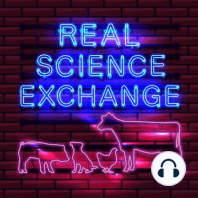62 min listen

Epigenetics Will Change How We Manage Cattle
Epigenetics Will Change How We Manage Cattle
ratings:
Length:
42 minutes
Released:
Sep 5, 2023
Format:
Podcast episode
Description
Guests: Dr. Jack Britt, Jack H Britt ConsultingThis is the first in a series of presentations given at the 2022 Tri-State Dairy Nutrition Conference. Epigenetics of different environments and reactions is the topic at hand, presented by Dr. Jack Britt of Jack H Britt Consulting.Dr. Britt begins by clarifying that epigenetics (transmittable changes in genetic behavior of an individual), are only beginning to be understood. This is partly due to the intricacies of DNA. For instance, the expression of DNA can vary greatly and the process of synthesizing a protein is much more complex than DNA to RNA to protein. 5:32The tendency of DNA to change over time is the focus of epigenetics, creating positive DNA changes is the focus of multiple dairy cattle studies discussed.After pointing out that epigenetics is mainly influenced by environment and management, Dr. Britt discusses its implications by giving an example of the pregnant cow. Each pregnant cow represents three separate generations at one time: the cow, fetus, and ovaries in the fetus. 8:34Genes multiply to produce new life and continue multiplying after birth in various types of cells. Thus, Dr. Britt notes that a change in a gene, such as when a methyl group alters DNA expression, that alteration multiplies along with the gene, creating an epigenetic effect. 11:25Studying epigenetics is commonly done in twins, Dr. Britt gives the example of his identical twin brother. His brother died of Parkinson’s disease a few years ago, demonstrating that the disease is an epigenetic (due to environmental change) disease instead of a genetic one. 14:56What are areas where epigenetics have significantly impacted the production of dairy cattle?Numerous cases are detailed by Dr. Britt, one being the decrease in fertility that correlates with a body condition score loss after calving. An oocyte matures in approximately 101 days, meaning it begins to develop soon after calving, when the cow is potentially at the lowest weight. The egg produced by this cow typically dies 4-5 days after fertilization. 23:07Technology has created improvements in environment and management factors. Dr. Britt references the University of Guelph, where a new technology is being used to monitor and distribute calves’ energy intake to ensure they consistently gain weight during weaning. 28:57Concluding his talk, Dr. Britt poses the question: How can technology be used to create a reputable activity score of important factors among each herd? Such a score would allow for long term comparison across herds, allowing for epigenetics to estimate performance. 33:45Please subscribe and share with your industry friends to bring more people to join us around the Real Science Exchange virtual pub table. If you want one of our new Real Science Exchange t-shirts, screenshot your rating, review, or subscription, and email a picture to anh.marketing@balchem.com. Include your size and mailing address, and we’ll get a shirt in the mail to you.
Released:
Sep 5, 2023
Format:
Podcast episode
Titles in the series (100)
Impacting Milk Components: Guests: Dr. Tom Overton, Cornell University and Corwin Holtz, Holtz-Nelson Dairy Consultants The last 18 months have been challenging for the ag industry, and we've seen a rollercoaster of milk prices throughout the COVID pandemic. As the world begins to normalize, we can now shift our focus to impacting efficiency and profitability across the dairy operation. Tonight, we’re going to get really practical and dig into ways we can improve milk component production. by Real Science Exchange